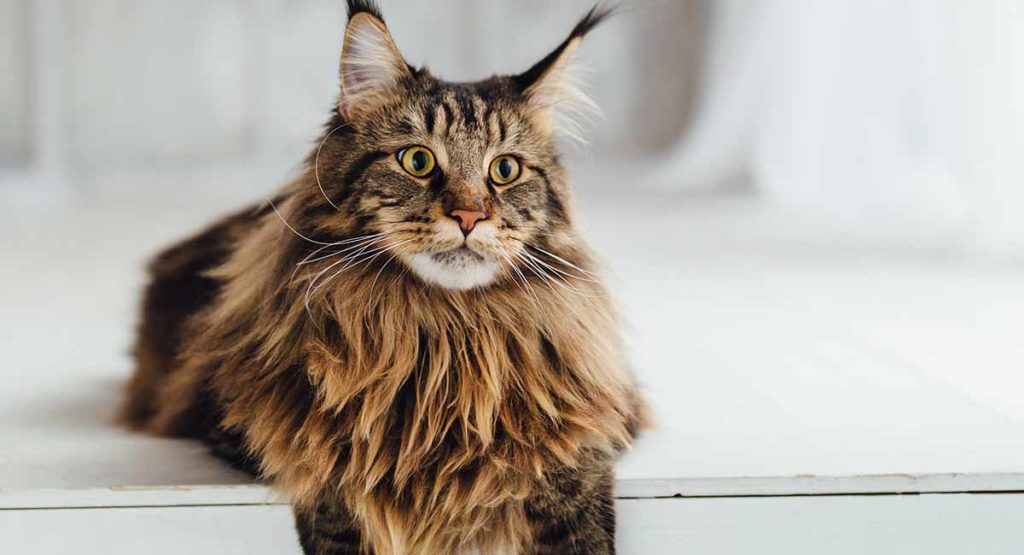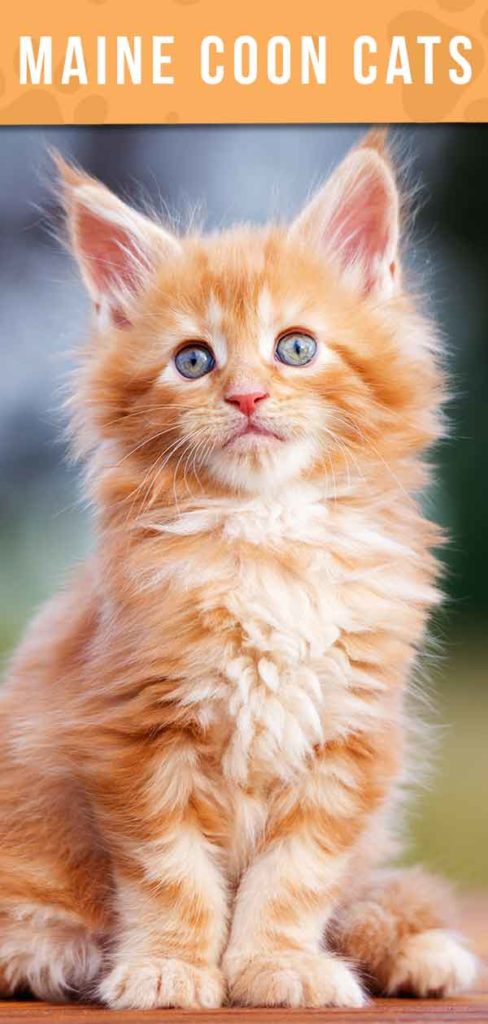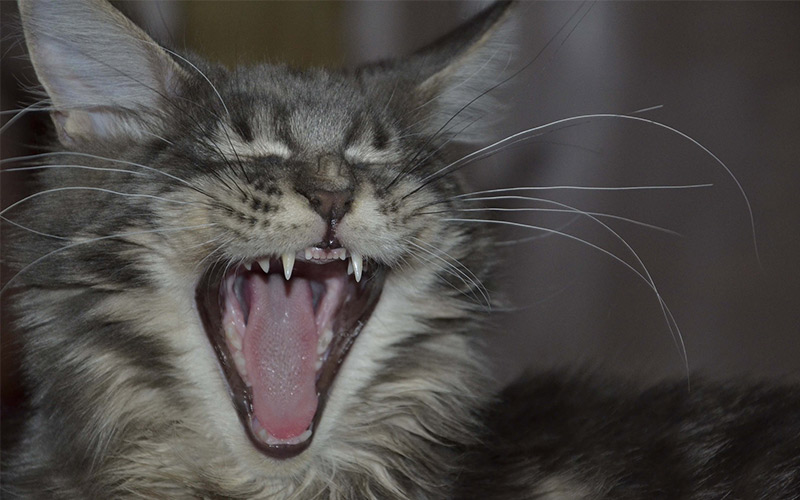
Maine Coon cats are a longhaired, large cat breed that can weigh up to 18 pounds. These cats are increasingly popular due to their beautiful coats, which come in a wide variety of colors and patterns. They can be loving and affectionate to people they know, but can also be quite independent. They are hardy, sturdy cats, well suited to harsh climates and with a kind and gentle disposition and loyal nature.
Contents
- Where do Maine Coons come from?
- Character and personality
- How big are Maine Coons?
- Coat colors and grooming
- Lifespan and health problems
Maine Coon History
These large shaggy coated cats were found as far back as the 1800’s in Maine, New England. They were employed as ship’s cats, catching mice and generally providing company to those aboard. The earliest published reference was to a black and white Maine Coon cat in 1861.
We don’t know for certain who brought Maine Coons to North America originally. And although there are plenty of theories, none of them seem to have a basis in recorded texts. So we just can’t be sure.
One theory is that they were bred from the long haired cats owned by Marie Antoinette, smuggled to the United States by an aide who was hoping to save her. We can be confident that the name Maine Coon was probably derived from the breed’s tail markings, which resemble a raccoon’s ringed tail.
Changing fashions
These lovely cats were very popular in the late 1800s and early 1900s, with Maine Coons proving popular entrants at cat shows and exhibits. However, they became less prevalent as the years progressed and fashions and tastes moved for a while to other breeds like the Persian and Siamese cats. In recent years, however, the breed’s popularity has once more risen up.
The Maine Coon Breeders and Fanciers Association (MCBFA) was formed in 1968, and today the breed is once again a big player at cat shows as well as family pets. Sadly, their numbers dwindled dramatically in the intervening years, meaning that those bred today have come from a small group.
The MCBFA now has a membership including over 200 breeders. But this relatively small gene pool may have contributed to the higher than average occurrences of health problems in this beautiful breed.

Maine Coon Personality
These big cats have a personality to match. And that personality is a major reason for the breed’s current rise in popularity. They provide company without being too pushy. And although vocal at times, they are not usually excessively noisy.
They are happy being petted and sometimes sitting on laps, although they are usually happier just being in close proximity to you. They are also largely tolerant of children’s attention, making them a great playmate for sensible older kids under supervision.
Their dog like devotion to their families is often accompanied by an aloofness with strangers. However, they do tend to be prolific hunters. And as large cats, they may be able to catch larger prey than you might expect! This is something to be aware of if your furry friend will be spending time outside.
They are normally fine to be left for the length of an average working day of around 8 hours. Just make sure that they have food, water, ample room to stretch their legs, somewhere safe and dry to sleep and a clean litter tray.

Size And Weight
One of the most striking things about these gorgeous cats is their size. One of the largest breeds of cat, an adult Maine Coon cat will usually weight anywhere up to 18 pounds for a male, and around 14 pounds for a female.
Average full grown weight is from 10 to 20 pounds. These cats usually reach maturity from three years of age, a little slower than other smaller cat breeds. While the largest size can even go above 20 pounds, this is not ideal. With extra weight comes the potential for more health problems. Especially to consider are those problems related to their hip joints, which extra weight can exacerbate.
A huge cat may seem adorable, but it’s important to assess whether his size is due to his natural body structure or excess fat being stored.

Colors And Coats
This is a breed with a very distinctive coat. It is longest at the front and on the tail, which is soft and fluffy, with rings of darker coloration around it. The ears are also quite striking. They are wide at the base, and a feature of the breed is the long tufts of hair sticking up from the tips of the ears.
Eyes can vary in color, including green, blue, gold, or copper. They tend to be more rounded than other cat breeds, and very large. There are a wide range of coat colors as these have never been restricted in their breeding programs. Solid, bicolor and a variety of tabbies are all possibilities.
Grooming Your Maine Coon
Grooming is something you will need to consider when adopting a cat or kitten. These are not low maintenance coats and if leave your cat to look after their own grooming requirements, you can end up with a badly matted cat.
Combing your cat’s fur twice a week with a stainless steel comb will help to keep it tangle free. It will also get rid of some of the loose hairs, dirt and make sure it stays looking nice and shiny.
The breed is fairly easy to handle, which makes brushing possible without too much fuss for most owners. Just remember to comb very gently, not tugging at the tangles sharply but with repeated gentle strokes.
If you are bringing home a kitten then get them used to being combed from the first week they are with your family. Short daily sessions starting with three or four gentle strokes with a brush are best.
Your cat’s coat won’t need grooming straight away, but the sooner they are used to the action, the more likely they will be to tolerate it as an adult cat.
If your cat will accept little cat treats from you while you do it, that will help to make the experience more enjoyable for him and more likely to be accepted on future occasions.

Are Maine Coons Hypoallergenic?
Maine Coons do shed. Combing will help reduce the amount of fur which is scattered around your home, as well as the frequency of hairballs. Even with frequent grooming, you will likely need to invest in a good pet hair vacuum cleaner to keep on top of things
Many potential cat owners who suffer from allergies are constantly in search of a truly hypoallergenic cat breed.
However, the sad fact is that there are no absolutely, no-holds-barred allergenic cats. This is because the problem is not entirely with fur or shedding, but rather with the cat’s saliva. And all cats lick!
On top of that, it must be noted that longer haired cats are not recommended for those who have allergies. So the Maine Coon is probably not the best choice if you have allergy problems already.
On the other hand, we do suggest this article for more in-depth guidance to “hypoallergenic” cat breeds that may be better for those with allergies.
Health Problems
There aren’t an enormous number of purebred Maine Coon cats around. In the early 1900s, this dwindled very low indeed. Low populations cause low genetic diversity. This means that some genetic health problems are fairly widespread within the breed.
- Hip dysplasia
- Feline hypertropic cardiomyopathy
- Spinal muscular atrophy
Lifespan
The only study that we currently have which looked specifically at Maine Coon lifespan shows an average of 11 years. These cats ranged up to 19 at the highest end of the spectrum.
However, the pool was quite small, so we should take this with a pinch of salt.
Buying a kitten from health tested parents is the best way to ensure that your kitten starts off on the right track for a long and happy life. And keeping them slim will help to reduce the risk of the obesity related health issues that are becoming increasingly common in cats

Finding A Good Breeder
If you decide to bring a Maine Coon kitten home, you will need to do some research to find a good breeder. The best breeders will probably have a long waiting list, so you won’t be able to pick up a kitten immediately.
It’s very important to find breeders which follow ethical best practices, put the health of their cats and kittens first, conduct health tests, and understand the importance of socialization.
Check the parents have been health tested, and that the breeder takes good care of the mother and has a purpose for her beyond making kittens. She should be a treasured pet, or an adored and well treated show cat.
Maine Coon Price
Price is a sticky subject, because these beautiful, charismatic cats do not come cheap. Kittens from a good breeder will probably be more expensive. The breeder will have had considerable outlay on paying for health tests for their queen, and a stud fee for the right partner for her.
A kitten will cost you anything from $400 to $1000 in the US. Prices vary considerably depending upon where the breeder is located, what health tests their cats have undergone and what purpose they are breeding for.
Rescue
Another way to get one of these lovely cats into your life is to look for a rescued cat.
It is sometimes possible to get your hands on a Maine Coon rescue, if you are lucky. A friend of mine currently shares his life with one such beautiful kitty. Many Maine Coon type cats in shelters are not purebred, but still may have many of the characteristics of the breed.
Your best chance is with a rescue society that specializes in the breed. General cat rescue organisations can have cross breeds and occasionally pure bred Maine Coons as well.
If you are specifically looking for a purebred, you may have a long wait on your hands, but mixed breed cats will come along with more regularity.
Chat to your chosen rescue about why you are looking for this breed and be open to their other suggestions for cats who fulfill the criteria you are looking for.
I would be so honored to have a Maine Coon and I am interested in getting one for myself and I look forward to spoiling the beautiful baby
Thanks for your wonderful informative article. I have had a Maine Coon in my life since 1983. I today have Quimby. A lovely huge apricot/white 17 pound 2 year old male. He is my 10th Maine Coon. i had one live to be 17, one 18, one 15. Loves of my life.
Glad you liked the article Becky, love your cat’s name 🙂
I would like to buy an unaltered male maine coon. I’ve seen pictures, and read information on the breed, and I love large cats. I would love to welcome one into my home
This was a great article. I learned a lot. My cat stormy has Maine coon in her. So it’s nice to know some things about them. I got her from a rescue shelter and they didn’t even know the type. The vet says medium hair domestic cat but she is humongous and has very pretty coat. I’m thinking of getting her tested to see.
Hello, I have a mixbreed Mainecoon-domestic. He got many maincoon characteristics such as tufted toes, fluffy neck and chest, big boned, and hairy ears.
Can he grow up as big as pure mainecoon cats?
The more I read about this breed the more I think our Spanky was a Mixed MainCoon. Unfortunately he passed away recently of cancer and now we are looking for another all white, blue eyed cat. Spanky was deaf but that made him all the more special. Any help in finding one would be appreciated. I’ve had cats all my life and can’t really be without one. Below is my e-mail adrs and I will respond quickly.
I have Edward whom I found at Paws Don’t Kill in Atlanta. He is now six
Years old and the love of my life. He looks like a lion and people in my retirement home come to visit him. He is very smart and shows off when friends visit. The residents call him King Edward
If you can not have a dog, this is the cat for you! What lovers! I have always found in all cat breeds that the male cats are more friendly.These cats need grooming, and they love playing with water, mine always tried to jump into the bath!
Could anybody tell me if a Maine Coon needs tick prevention? I don’t know how a tick could get through to the skin past the long hair. Am I right?
Unfortunately no matter how thic the coat on your cat it’s never a definitive barrier against ticks. Moreso they can be a bigger problem with thick coated cats, since it’s way harder to spot and remove them.
I was a lucky gal to be volunteering at the Humane Society and they got a deaf Maine Coon kitten. She didn’t know how to socialize with cats or people. I was to socialize kittens and cats. I fell in love with her and adopted her. It is different having a deaf pet, but I do not regret adopting my adorable “little” Heidi! She was runt of the litter and they didn’t want to put her down! She is so affectionate! It was my good fortune! PS: Heidi does like my Dachshund puppy. It was 2 years before she would let me touch her. She strongly suggested I put Rosie on the Wednesday give away table. Heidi would give me the butt treatment . She would turn her rear to me and not let me touch her after I got the dog. It was 😖!
It is absolutely vital to check the breeder and inspect their premises. Wee bought a kitten with a good pedigree from a breeder who, unfortunately, was keeping two litters of kittens and three adult cats in one medium-sized room. Now kittens from the same litter will hassle, but kittens from a different litter will smell wrong and be seriously attacked. Poor Floofy was badly beaten up for the first weeks of her life and came to us with all her whiskers chewed off. They are a sense organ for a cat. It must have been like being partially blinded.
With such a start in life, she understood that life consisted of fighting. As she grew up, we had a large, strong, hellcat who was fairly dangerous to be anywhere near. It was impossible to pet or comfort her. She would interpret a hand approaching her as an incoming blow, hiss, wowrrl and lash out. Later she realised she was safe with us, but we still had a large, passionate, loving, badly-behaved feline delinquent.
She gradually calmed down. After many years of care and love we now have a completely magnificent cat. She is big, beautiful, devoted and very gentle. She finally seems to have got all the hell out of her system. She loves to sit next to me and purr, with a lovely loud deep rumble. But if she had not had that wicked start in life, she might have been the lovely companion she is now, right from the start.
So check the breeder. It is really important.